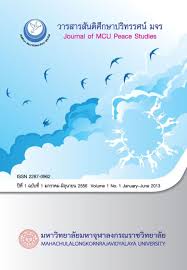From “Dharmarājā” to Buddhist Good Governance: Buddhist Wisdom for Development of Economy and Society
Main Article Content
บทคัดย่อ
The concept of ‘Good Governance’ has arisen to correct the problems caused
by the fl ows of globalization and liberal democracy of which the huge group of capitals
has an infl uence over the government by joining with leader group or local politicians
for seeking private benefi ts rather than common interest that causes the inadequacy of
ruling mechanism to handle the increasing of social complexity. Moreover, the huge group
of capitals also needs such guarantee for the creditors in asking for debts. Therefore,
this concept has been used as a tool in protecting for the interest of the minority group
rather than for the majority one. The mechanism of this concept has the characteristic of
autocracy. On the other hand, the concept of ‘Dharmarājā’ existed in Jakkavatti
Sutra of the scripture, the important Phra Sutra in Buddhism, the one who is called
the ‘Dharmarājā’ will hold on to The Rule of Law (DhammaDemocracy) which is
the righteousness according to reasons including both private and others’ interests.
The concept of ‘Dharmarājā’ is therefore the origin of Buddhist Good Governance that
has got the outstanding ideology and aim to solve the problems both in the structure
and individual levels; plus, the aimto correct the decline of morality in society by
not overlooking the economy problem. In developing the system of ‘Good Governance’,
Buddhism regards the wisdom in every context which is called ‘Yonisoanasikāra’
and ‘Paratokosa‘. The Buddha adviced that the mind is the owner of our behaviors;
if humans have responsibilities towards their own behaviors, the chaos in society will
fi nally decrease to peace.
Article Details
ทัศนะและความคิดเห็นที่ปรากฏในบทความในวารสาร ถือเป็นความรับผิดชอบของผู้เขียนบทความนั้น และไม่ถือเป็นทัศนะและความรับผิดชอบของกองบรรณาธิการ ยินยอมว่าบทความเป็นลิขสิทธิ์ของวารสาร


